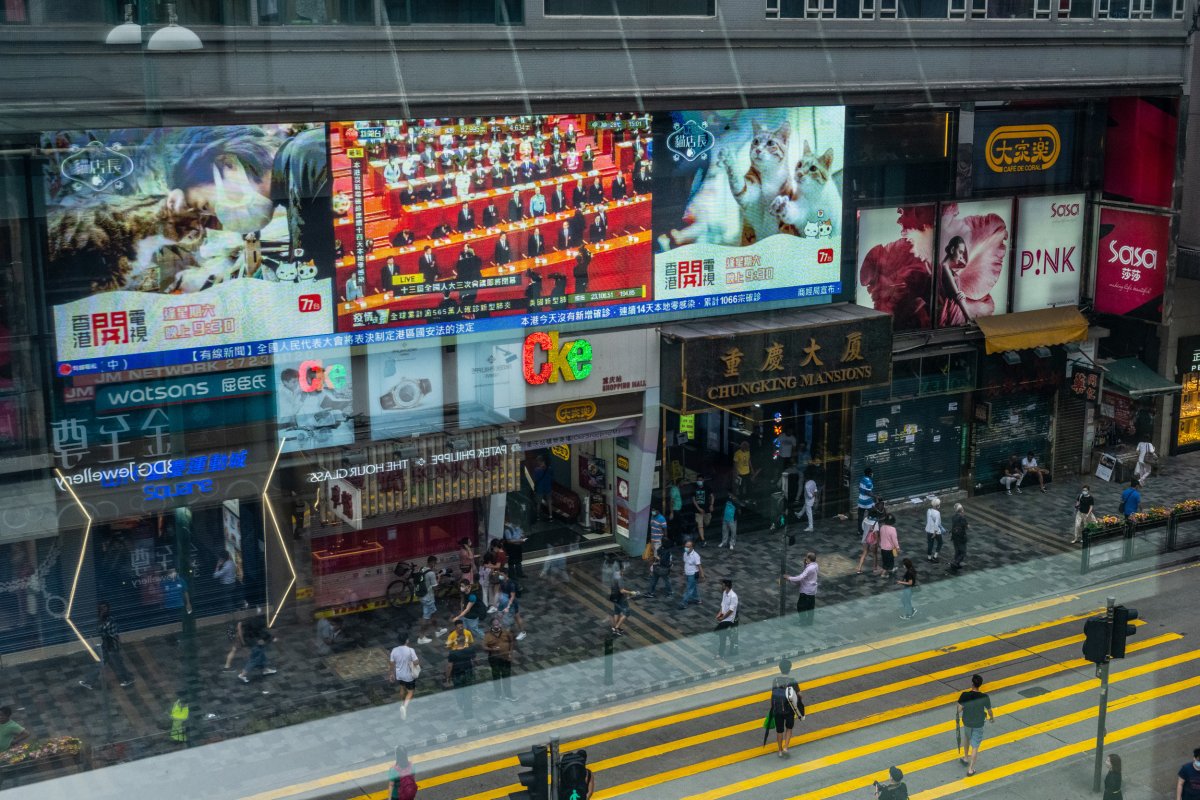The United States is expected to sanction Chinese businesses in Hong Kong after Beijing cracked down on separatism in the city, opposition leader Joshua Wong said, despite China's threats to take action against any country that interfered with its new national security legislation.
Speaking to Newsweek Thursday, Wong, secretary-general of the pro-democracy Demosistō party, said that he expected the U.S. would single out companies tied to the mainland government and avoid imposing restrictions on Hong Kong citizens who visit the United States.
"According to my understanding, the student visa or travel permit of HK citizens will not be affected," Wong told Newsweek. "Also, the sanction will target red-capital related to dual-used tech that serves the interest of Beijing."
Washington had threatened to revoke Hong Kong's longstanding special trade status with U.S. companies if Beijing limited the self-rule of the city that has been in place since the United Kingdom handed it over more than 20 years ago. On Thursday, the National People's Congress passed new national security legislation that expanded China's ability to crack down on pro-independence currents in Hong Kong.
In a statement sent to Newsweek, a representative from Beijing's embassy in Washington said that the new legislation does not impact Hong Kong's autonomy and will not threaten its citizen's freedoms. The spokesperson also warned China would take action against any country that interfered with its decision.
"Hong Kong affairs are China's internal affairs and allow no external interference," the spokesperson said.
"[The legislation] will provide a fundamental guarantee for the effective implementation of 'One Country Two Systems,'" the spokesperson added. "As for foreign meddling in Hong Kong affairs, we will take necessary countermeasures in response."

Hong Kong's government did not immediately respond to Newsweek's request for comment, but Chief Executive Carrie Lam also assured residents that the new law would not affect their rights and freedoms. She vowed "to enhance enforcement and public education in relation to safeguarding national security, and report regularly to the Central People's Government"
In Beijing, Chinese Premier Li Keqiang said in a news conference Thursday that the new national security law was in line with the"one country, two systems," adding that it would help to "maintain Hong Kong's long-term prosperity and stability." He also called for closer cooperation between Beijing and Washington.
However, the United States and its close partners Australia, Canada and the United Kingdom issued a sternly worded statement that said the new law violated the United Nations-registered Sino-British Joint Declaration of 1984, could hinder compliance with other international commitments, and may generally further destabilize the city.
"We are also extremely concerned that this action will exacerbate the existing deep divisions in Hong Kong society; the law does nothing to build mutual understanding and foster reconciliation within Hong Kong," the statement said. "Rebuilding trust across Hong Kong society by allowing the people of Hong Kong to enjoy the rights and freedoms they were promised can be the only way back from the tensions and unrest that the territory has seen over the last year."
Hong Kong was rocked last year by a months-long series of massive, sometimes violent demonstrations in response to the local government's proposal of a bill that would allow criminal suspects to be extradited to other parts of China. These protests were paused amid concerns about the global coronavirus pandemic, but activists have begun to rally again in response to the latest security legislation from Beijing.
On the eve of the Chinese law's passage, Secretary of State Mike Pompeo told the U.S. Congress on Wednesday as part of the department's annual assessment of Hong Kong's political status that "no reasonable person can assert today that Hong Kong maintains a high degree of autonomy from China."
An editorial by the Chinese Communist Party's Global Times publication dismissed Pompeo's remarks on Hong Kong as "arrogant" and "hysterical" and described U.S. officials as "too narcissistic" for claiming a stake in Hong Kong's fate.
Uncommon Knowledge
Newsweek is committed to challenging conventional wisdom and finding connections in the search for common ground.
Newsweek is committed to challenging conventional wisdom and finding connections in the search for common ground.
About the writer
Based in his hometown of Staten Island, New York City, Tom O'Connor is an award-winning Senior Writer of Foreign Policy ... Read more
To read how Newsweek uses AI as a newsroom tool, Click here.








